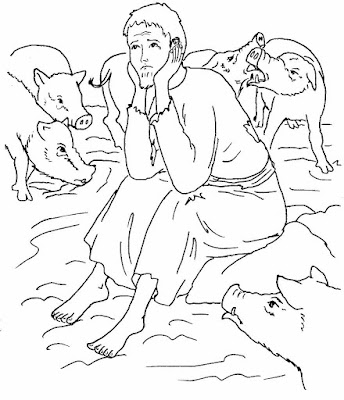IV SUNDAY OF LENT - Luke 15:1-3, 11-32
In Luke’s gospel, Jesus puts forward the ideal for his disciples: “Be merciful, even as your Father is merciful.” (Lk 6:36). In a way, Jesus’ words echo the proclamation made by God before Moses on Sinai:
“The LORD, the LORD,
a God merciful and gracious,
slow to anger,
and abounding in steadfast
love and faithfulness,
keeping steadfast love
for thousands,
forgiving iniquity and
transgression and sin” (Ex 34:6-7)
In his second letter to the Corinthians, Paul presents God as the one who reconciles us with Him through Jesus Christ: “It was God who reconciled us to himself through Christ” (2 Co 5:17-21). Being a merciful God, He takes the initiative.
In Jesus Christ, God’s mercifulness is revealed to the full. Then, we should not be surprised that the “tax collectors and the sinners were all seeking the company of Jesus”. However, the Pharisees and the scribes could not understand that, and they complained bitterly: “This man, they said, ‘welcomes sinners and eats with them.” It was then that Jesus told the parable of the father with two children. The father stands for God, and the children for humanity. Despite God’s love and care, we are never satisfied with him. At any time, we find plenty of reasons to ignore and despise him, turning our backs on him. Both cut ties with the Father. In a way, both killed the father, rejecting to behave like children.
The youngest one demanded his share of the inheritance as if the father had died. Then, gathering all his wealth, he “left for a distant country”, where he would quench his thirst for freedom, autonomy and independence. He could not stand his father’s house; there, he felt stifling. He needed to breathe different air and prove that he could take care of himself. And his dreams and project of life ended in failure. He proved to be irresponsible. Life is hard enough when we live with others and becomes unbearable when we rely solely on ourselves. We cannot build a meaningful life base on wealth and pleasure. At a certain moment, he realised that his life was a mess leading him self destruction. He needs his father to make sense of his life. Sooner or later, we have to reorient our lives, discovering that God alone gives purpose and meaning to our personal history.
The eldest was completely different: well-behaved, hardworking, and responsible. He was a good man. We might wonder where it went wrong. His self-righteousness brought him down. He accepted his share of the inheritance but continued living in his father’s house. However, he felt as if his father stood in his way to freedom and independence. His heart was set on his property and wealth. Coming from the fields, he behaved like a stranger. He did not rejoice when informed that his brother had returned. For him, his brother had died long ago, and his memory had been erased from his heart. Full of resentment and anger, he refused to enter the house, accusing his father of being unfair. Hurt in his pride, he could not recognise the father who overlooked the misdeeds of the younger son instead of administering the deserved punishment. The father insisted that he enters the house. However, the doubt remains. He might have persisted in his refusal.
The Father respects his children’s freedom. He does not force them to remain with him. They have to make their choice and live with the consequences of that choice. Despite turning their backs on him, he never stopped loving them. Whenever we go back, God accepts us not as servants but as children.
Let us repeat with the psalmist:
Taste and see that the Lord is good.
Look towards him and be radiant;
let your faces not be abashed.
This poor man called, the Lord heard him
and rescued him from all his distress. (Ps 34)



